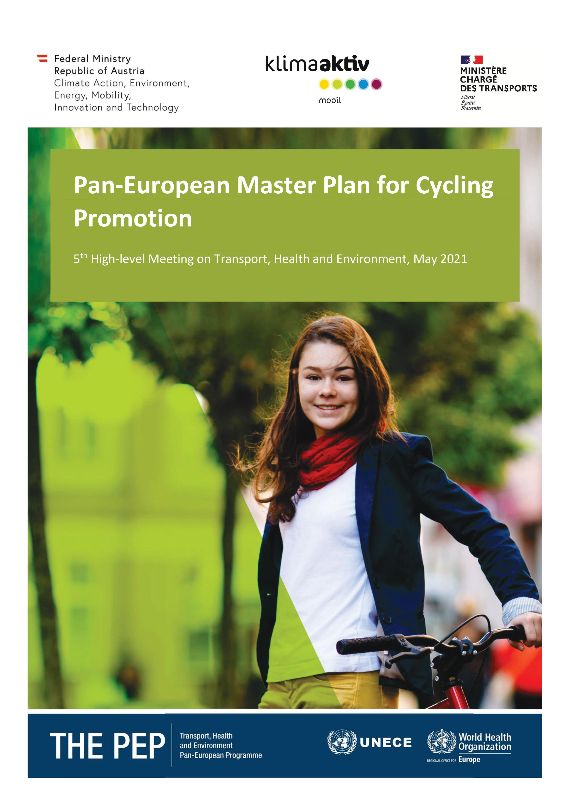The THE PEP (Transport, Health & Environment Pan-European Programme) convened in May 2021 in Vienna for the Fifth High-level Meeting. More than 850 participants from 41 countries attended the virtual meeting and agreed on the first ever Pan-European Master Plan for Cycling Promotion. The master plan was developed under the leadership of Austria and France and with the involvement of 28 countries, UNECE (United Nations Economic Commission for Europe), WHO (World Health Organisation), the European Cyclists’ Federation (ECF) and the cycling industry.
Benefits of cycling
Cycling entails plenty of benefits and contributes to the implementation and pursuit of a number of Sustainable Development Goals (SDGs). Regular cycling increases physical activity levels, with all the associated benefits such as prevention of non-communicable diseases (NCDs), including heart disease or diabetes. Furthermore, cyclists take up far less space than cars in the public area, do not cause congestion, produce next to no emissions, and save energy. After walking, cycling is the cheapest mode of transport, which can help democratise mobility.
Walking and cycling are viable mobility options for short and medium-distance trips, “even during transport system-disrupting events such as pandemics” (THE PEP, 2021). As the Covid-19 pandemic has illustrated, cycling can help stay physically active while maintaining social distancing. The THE PEP Member States recognise the manifold benefits of cycling and agree to promote cycling on all levels – contributing to sustainable livelihoods, a better environment, improved health and safety, greater social inclusion and economic prosperity, and overall improvements in the quality of life in the pan-European region.
Forging ahead with concrete targets
The Pan-European Master Plan for Cycling Promotion includes a number of ambitious goals and targets to be implemented by 2030, such as a significant increase of cycling and the expansion and improvement of cycling infrastructure in every THE PEP country. To reach these bold objectives, recommendations of actions are summarised. These recommendations are based on good practice in the region and on evidence. The “Toolbox of actions for cycling promotion” in the annex of the master plan presents various good practice examples to guide implementation of actions.
At the end of the master plan, joint actions in the pan-European region are detailed. It is clear that these efforts require cooperation, coordination, and the exchange of knowledge and best practice examples. In addition, efforts should not end with cycling: in a next step, more focus will thus be put on walking and the entire range of active mobility.
Efforts at the national level to accompany the Master Plan
Every country of the THE PEP is called upon to develop national cycling policies, plans, strategies, and programmes to expand and improve infrastructure for active mobility, and to incorporate cycling into other policy areas, such as public health and urban planning.
The Cycling Master Plan and the tenfold increase in the budget for cycling promotion are milestones and critical contributions made by Austria towards the promotion of cycling. With the initiative “klimaaktiv mobil”, cycling receives much needed attention and investments in healthy and green mobility are provided – important steps towards a sustainable, climate-friendly and active future of mobility.


_lolostock_570x380.jpg/jcr:content/iStock-493958393_(c)_lolostock_570x380.jpg)


